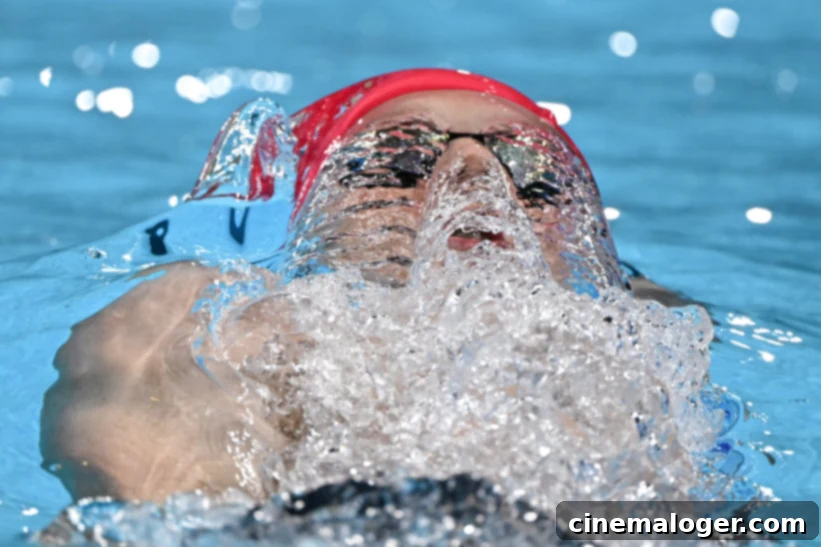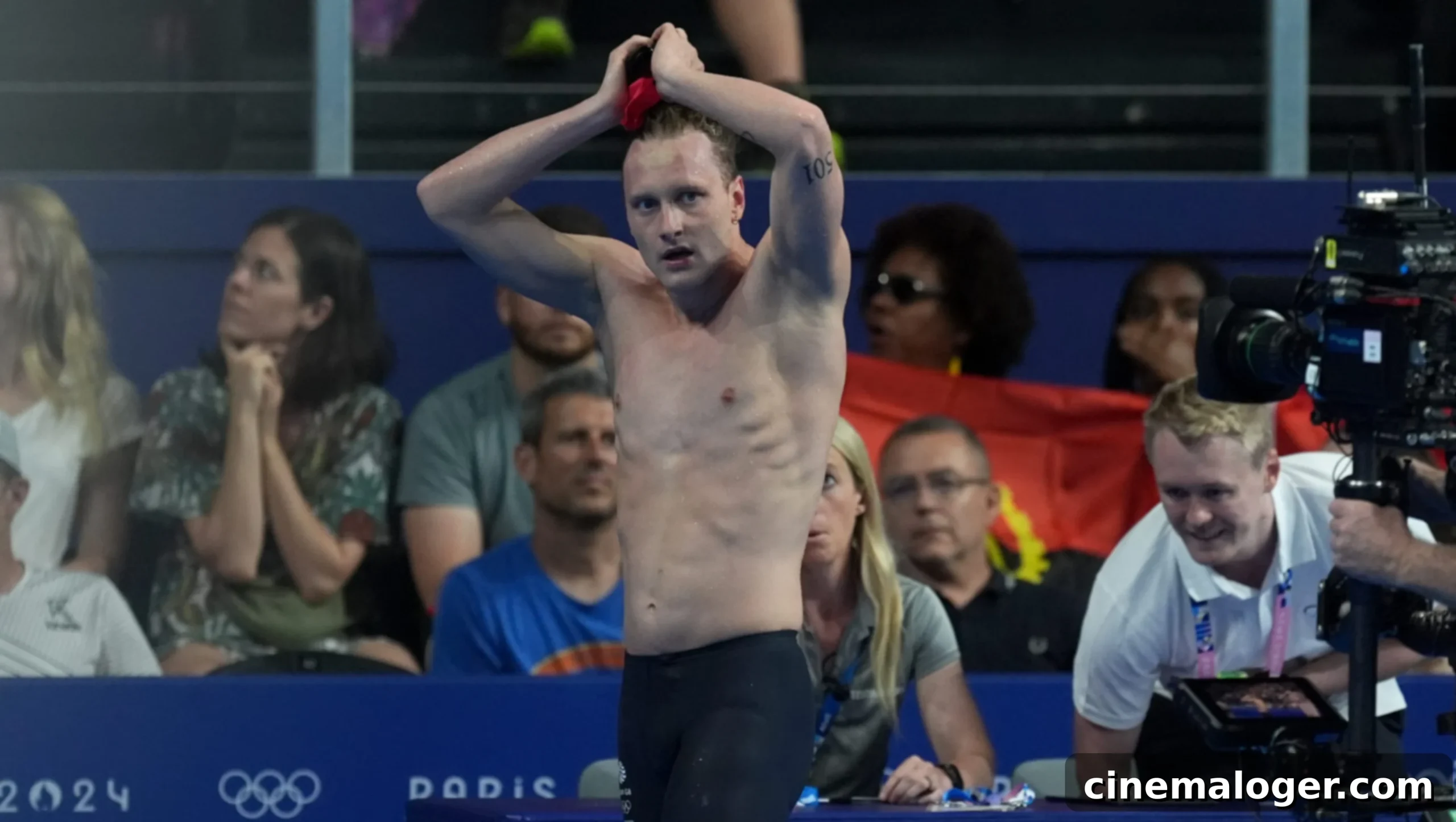Luke Greenbank’s Heartbreaking Disqualification at Paris 2024 Olympics: The 15-Meter Rule Explained
Team GB swimmer Luke Greenbank faced a devastating end to his hopes in the men’s 200-meter backstroke event at the 2024 Paris Olympics. Despite an impressive performance that saw him finish the race first, the 26-year-old athlete was shockingly disqualified, bringing his journey to an abrupt and unexpected halt. This incident has sent ripples through the swimming community and highlighted the stringent rules that govern elite competitive swimming, even at the highest levels of international sport.
The British swimmer Luke Greenbank had delivered a stellar performance in the men’s 200-meter backstroke heats, touching the wall in a remarkable time of 1:56. The initial elation of securing the top spot, a crucial step towards the semi-finals and a potential medal, quickly turned into profound disappointment. News of his disqualification reached him shortly after the race, confirming that his ambition to compete for Olympic glory in this event had been tragically cut short due to a technical infringement, a bitter pill to swallow for any athlete.
The reason for Greenbank’s disqualification, which occurred on July 31st, revolved around a specific yet often overlooked regulation during the 200-meter backstroke event. The infringement involved swimming beyond the allowed 15 meters underwater at the start of the race. This technical rule, while critical for maintaining fairness and specific competitive advantages in various strokes, can be particularly brutal when applied in high-stakes competitions like the Olympic Games, where margins of error are microscopic.
The emotional impact on Luke Greenbank was immediate and visibly devastating. As the scoreboard displayed the dreaded ‘DQ’ next to his name, his expression transformed from one of anticipation to utter despair. In a moment of raw emotion, he put his hands to his head in distress, a universal gesture of anguish, before dropping to his knees beside the pool. This poignant image encapsulated the heartbreak of an athlete who had poured years of dedication into reaching this pinnacle, only to have his dream shattered by a fractional oversight.
Following the heartbreaking news, Luke Greenbank spoke to reporters, his voice heavy with disappointment, reflecting on the upsetting disqualification. His words conveyed the depth of his sorrow and the frustration of having his hard work undone by a rule violation.
“I don’t know what to say, absolutely gutted,” he shared, struggling to articulate the profound sense of loss. “It’s really annoying. I feel like I’m on good form.” His statement underscored the bitter irony of the situation; an athlete feeling at the peak of his physical capabilities, ready to contend for medals, suddenly finding his Olympic journey in his signature event curtailed. The feeling of being “on good form” only amplified the sting of a disqualification that denied him the chance to prove it on the world stage.
According to World Aquatics, the international governing body for competitive swimming (formerly known as FINA), specific rules apply to underwater swimming. For events like the backstroke, swimmers are strictly prohibited from remaining fully submerged for more than 15 meters after starting the race or completing a turn. This rule is in place to ensure fair play and prevent swimmers from gaining an undue advantage by spending excessive time underwater, where drag is typically reduced, allowing for faster speeds. The rule emphasizes the importance of the surface swimming aspect of the stroke.

“By that point, the head must have broken the surface,” the rules explicitly state, emphasizing the precise nature of the requirement. To aid swimmers and officials, red buoys are strategically placed along each swimming lane, serving as clear visual markers for the 15-meter point. While this 15-meter rule might not be widely understood by the general public or casual viewers of swimming, it is a fundamental and well-known regulation among competitive swimmers and coaches worldwide. They dedicate countless hours to perfecting their starts and turns to ensure compliance. This rule is applied in various strokes, including backstroke, butterfly, and freestyle events, where underwater efficiency can significantly impact speed. However, it does not apply to breaststroke, which has its own distinct set of underwater pull and kick rules that govern its unique mechanics. The rigorous enforcement of such rules underscores the technical precision demanded at the Olympic level, where even a slight miscalculation can result in severe consequences.
Greenbank’s disqualification is particularly poignant given his impressive track record. He is no stranger to Olympic success, having previously won the bronze medal in the very same 200-meter backstroke event at the 2020 Tokyo Olympics. Furthermore, he was an integral part of Team GB, contributing to their silver medal win in the highly competitive 4×100-meter medley relay. His established pedigree as a top-tier backstroke specialist made his early exit in Paris all the more shocking and disappointing for both him and his team. In contrast to Greenbank’s unfortunate fate, his Team GB teammate Ollie Morgan successfully progressed into the semi-finals, continuing his Olympic journey.
The British athlete’s disqualification, while a technical one on the field of play, is not the only instance of an Olympic journey being unexpectedly cut short at the Paris 2024 Games. In a separate incident that garnered significant attention, Brazilian swimmer Ana Carolina Vieira found her Olympic aspirations abruptly ended. She was sent home from Paris after being caught leaving the heavily secured Olympic Village with another teammate, Gabriel Santos, following the opening ceremony on July 26th. Such disciplinary breaches, while different from technical race violations, carry equally severe consequences, highlighting the strict code of conduct expected from athletes representing their nations.
The Brazilian Olympic Committee (COB) took immediate and firm action, punishing both athletes for their violation of team rules and Olympic protocols. However, the situation escalated further for Ana Carolina Vieira due to her subsequent reaction to the committee’s decision, turning an already serious matter into an even more severe disciplinary issue. The committee’s swift response serves as a strong reminder of the importance of maintaining discipline and adherence to regulations within the Olympic Village, which is a controlled environment designed to ensure athlete focus, security, and team cohesion.
After being reprimanded for her initial transgression, Ana Carolina Vieira responded to the “technical decision” made by the committee in what the COB’s press release described as a “disrespectful and aggressive” manner. This defiance in the face of authority further compounded her situation. Consequently, the COB determined that such behavior was unacceptable and warranted the most severe penalty, leading to her immediate dismissal from the delegation and premature departure from the Games. The incident underscores that athlete conduct, both on and off the field of play, is under constant scrutiny at the Olympics.
The official press release from the Brazilian Olympic Committee concluded: “Gabriel Santos was punished with a warning and athlete Ana Carolina Vieira, with the penalty of dismissal from the delegation. She will return to Brazil immediately.” This clear statement from the COB demonstrates their unwavering commitment to upholding disciplinary standards among their athletes, ensuring that all participants understand the gravity of their responsibilities when representing their country on the global stage. Both Luke Greenbank’s technical disqualification and Ana Carolina Vieira’s disciplinary dismissal serve as stark reminders of the extremely high standards and precise rules that govern every aspect of the Olympic Games, where even minor infractions can shatter years of dreams and dedication.
